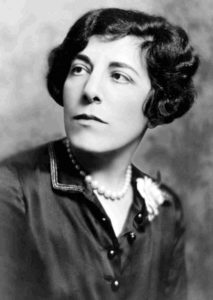Biography
 EDNA FERBER (1885 – 1968) made her name with a brace of stories centred upon a travelling underskirt saleswoman, Emma McChesney, published in national magazines and collected into three volumes between 1913 and 1915; a successful stage play and film starring Ethel Barrymore followed. These books accumulated for Ferber a significant and loyal following, so much so that by the 1920s her writing career was in full swing. She had become successful and celebrated. The 1924 novel So Big was awarded the Pulitzer Prize, and a Hollywood film version of it was made almost immediately. Its literary success was in large part due to the confident marketing campaign of its publisher, Doubleday, who thought highly of both the book and of its author, for “who would be interested in a novel,” wrote Ferber much later, “about a middle-aged woman in a calico dress with wispy hair and bad teeth, grubbing on a little truck farm south of Chicago?” A succession of successful and long-running plays peppered the decade (and beyond). The film of her novel Cimarron, published in 1929, went on to win an Academy Award for Best Picture in 1931. Florenz Ziegfeld’s 1927 production of the musical Show Boat was based on Ferber’s novel of the same name set on a floating theatre on the Mississippi; Ferber was dubious initially of their intent, but Kern and Hammerstein successfully challenged the norms of Broadway by melding musical cavalcade and a storyboard of consequence.
EDNA FERBER (1885 – 1968) made her name with a brace of stories centred upon a travelling underskirt saleswoman, Emma McChesney, published in national magazines and collected into three volumes between 1913 and 1915; a successful stage play and film starring Ethel Barrymore followed. These books accumulated for Ferber a significant and loyal following, so much so that by the 1920s her writing career was in full swing. She had become successful and celebrated. The 1924 novel So Big was awarded the Pulitzer Prize, and a Hollywood film version of it was made almost immediately. Its literary success was in large part due to the confident marketing campaign of its publisher, Doubleday, who thought highly of both the book and of its author, for “who would be interested in a novel,” wrote Ferber much later, “about a middle-aged woman in a calico dress with wispy hair and bad teeth, grubbing on a little truck farm south of Chicago?” A succession of successful and long-running plays peppered the decade (and beyond). The film of her novel Cimarron, published in 1929, went on to win an Academy Award for Best Picture in 1931. Florenz Ziegfeld’s 1927 production of the musical Show Boat was based on Ferber’s novel of the same name set on a floating theatre on the Mississippi; Ferber was dubious initially of their intent, but Kern and Hammerstein successfully challenged the norms of Broadway by melding musical cavalcade and a storyboard of consequence.
Edna Ferber was not only a bestselling author, but a well-regarded one, and she made connections easily in the literary world. Mythology records that she was an occasional member of the Algonquin Round Table, a loose collection of wits and competitive wags who wrote (and, indeed, believed in) their own press cuttings. Throughout the 1920s they dined almost daily at the Algonquin hotel in New York, and by all accounts Ferber, when present, more than held her own. Her put downs are much quoted. Of Alexander Woollcott, for example, who she referred to as a “New Jersey Nero who has mistaken his pinafore for a toga;” and of Noël Coward, who, when confronted by a cross-dressing Ferber remarked that she almost looked like a man, her retort: “so do you.” That she had humour and presence might have secured her the rights to dine out on her literary success, to sit back and bask in her reputation for as long as she wished. But she was capable still of making waves late in life. Giant, her lengthy novel published when she was sixty-seven, was set in Texas, where it was lambasted and met with severe furore. Ferber was unrepentant, her publisher’s sales team, of course, was delighted. The New York Times reviewed it with applause and great respect;” The Houston Press in Texas suggested Ferber be lynched. Its inevitable film merited a big budget, a red carpet Hollywood treatment that starred Elizabeth Taylor, Rock Hudson and, in his last role, James Dean. And when Edna Ferber died her obituary made the front page of The New York Times; also an entire inner page was devoted to her. If not the grande dame of American letters, she was, as the paper concluded, “among the best-read novelists in the nation, and critics of the 1920s and ’30s did not hesitate to call her the greatest American woman novelist of her day.”
This obituary commented also that Ferber’s books, if not profound, were “vivid and had a sound sociological basis.” She was indeed the true American, or at least what she understood that to mean, and she rejoiced in that. She wrote about the sort of characters she had come across in her youth: mercantile, commercial and quietly ambitious, clerks who worked in shop stores. Her women were strong-willed, here male characters prone to weakness; most hoped to improve their lot or reshape their lives. Especially the women who wished to rise above the supposed limitations of their backgrounds – like Emma McChesney in Roast Beef, Medium and its sequels, or Fanny in Fanny Herself: “madams seeking to become respectable,” is how The New York Times put it. Ferber believed that true working people possessed “a kind of primary American freshness and assertiveness,” and her writing attempted to do justice to them and their lives. She often imitated the “vigor and native tang” of working people’s talk; the conversation of a truck driver was always “more stimulating, saltier” than that of a man who “drove his own Cadillac.”
Ferber’s writing conveyed a broad yet nuanced vision of the United States, its work ethic, ambitious values and cosmopolitan aspect. She shared all these values in spades: she was industrious, successful and content with a defined sense of identity, even with her chequered pedigree. Her father was a Hungarian-born shopkeeper, her mother was of German-Jewish descent. She spoke often of her Jewishness, particularly with reference to the seven formative years of childhood that she spent in Ottumwa, Iowa, a town reputedly rife with antisemitism. Her Jewish identity was built perhaps more on the personal abuse she received and her devotion to her family than to any religious observance or allegiance to the Jewish world events of her era (though her autobiography was fuelled strongly by abhorrence for events in 1930s Germany and she was highly critical in public of Ben-Gurion). She claimed that as a child she received every day taunts of “sheeny,” slur that strengthened not just her sense of identity but also her “creative self-expression.”
Edna Ferber devoted her life to writing and was ambitious for it. She never married, had no children, is not known to have had any romantic or sexual engagement. In her first novel, Dawn O’Hara, the heroine’s aunt remarked, “Being an old maid was a great deal like death by drowning – a really delightful sensation when you ceased struggling.” She ring fenced herself casually: when on the road, either researching or accompanying friends, her companion often was her widowed mother. For Ferber, writing was a “necessary and chosen way of life” that excluded nearly all else. But there is little sense of self-sacrifice, or any self-conscious attempt to trade love or lust for her craft: Ferber just never appeared to be interested in intimacy.
The heroines of the twelve stories that comprise Buttered Side Down are usually in some way alienated from their big city environment, be it Chicago or New York. “I came to Chicago from Beloit, Wisconsin,” says Gertie in The Frog and the Puddle, “because I thought that little town was a lonesome hole for a vivacious creature like me. Lonesome! Listen while I laugh a low mirthless laugh. I didn’t know anything about the three-ply, double-barrelled, extra heavy brand of lonesomeness that a big town like this can deal out. Talk about your desert wastes! They’re sociable and snug compared to this. I know three-fourths of the people in Beloit, Wisconsin, by their first names. I’ve lived here six months and I’m not on informal terms with anybody except Teddy, the landlady’s dog…”
Alienation, or the distance she maintained between herself and other people or her environment, may have been Ferber’s general experience of life. Even as a child she described herself as observant before participative. She recalled, for instance, watching crowds slink home after attending matinees in town: “the passer-by does not notice you or care about you; they, the people, are intent on getting somewhere, their faces are open to the reader; they betray themselves by their walk, their voices, their hands, clenched or inert; their feet, their clothes, their eyes.”
What she referred to as the “inner life” of her imagination was her preferred world. She seemed to need little else. Her writing is noted for its sound and meticulous research, even if she chose to write always in the comfort of her New York apartment. Her early experience as a journalist – she had foregone attempts to train as an actress to support her family, her father had died early – suggests a default workaholism, when, on her own admission, she “worked like a man.” This led to a breakdown when she was only twenty-two. (Indeed, even when returned home to be in recovery from her collapse, she started to write her first fiction.) Her journalism had started when she edited the school newspaper; professionally she had started at the age of seventeen for local newspapers in Appleton, where the family had moved when she was twelve, and then Milwaukee. Her work culminated with her covering in 1920 both the Republican and Democrat National Conventions for the United Press Association. Undoubtedly skills learnt as a journalist informed the easy-paced style of her fiction, which has momentum and reads with a succinct yet pointillist grace, as though dictated. There are textual hints that she edited and sculptured her text, particularly its punctuation. But there is a runic, repetitive pattern to her prose that is used to build momentum (and for humorous effect).
A sense of drama is apparent in her writing, too. A childhood love of theatre never left her. She wrote or co-wrote nine plays, usually in tandem with producer and playwright George S. Kaufman who had a family background of trade similar to her own. A melodramatic tension is prevalent in the plotting of her fiction, as though it were to be blocked on stage. It was hardly by accident that so many films were made of her books. There is a theatrical sense of childish wonderment perhaps in her writing and a delightful ham quality often in her characters. Giant, for instance, can be seen as an overture for TV’s soap Dallas, where all men are oil barons or cattle ranchers, and the women sit sun tanned by pools and gossip about saloon brawls. Panoramic vision with a potential for the close-up, costume and greasepaint is what you get when you read her novels, a rehearsed script and underplayed if subtle stereotype. There is even inherent drama in her titles also. So Big was a working title only; Ferber was never at ease with it but came up with nothing better. Yet the title was instinctively histrionic. Retrospectively she wrote “I now think that those two short words, and their familiar ring… helped to make the book a selling success.”
Selina Peak de Jong, So Big‘s heroine (played in turn by Colleen Moore, Barbara Stanwyck and Jane Wyman in its film adaptations), was both gratefully grandiose and monumentally demure. She might be said to sum up Ferber quite well: “Always to her,” wrote Ferber, “red and green cabbages were to be jade and burgundy, chrysoprase and porphyry. Life has no weapons against a woman like that.”
“She prefers to write about those solid, sometimes humble people who are the very essence of American life and she knows profoundly the difference between what is American and what is imitation European… About everything she writes there is an atmosphere, a treatment, a penetration which is profoundly American.”
– Louis Bromfield, 1935, from The Saturday Review
“The United States is, as somewhere been said before, a big country, and there are still reaches of it is it Miss Ferber has not attended to. And in every one, there awaits a gold mine for the lady who is surely America’s most successful writeress.”
– Dorothy Parker, 1958, from a review of Ice Palace in Esquire

USPS stamp, 2002



